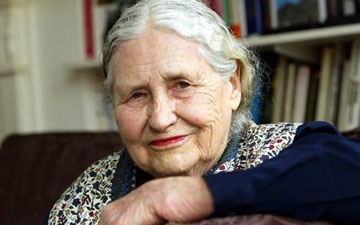Archivy | Autoři | Doris Lessingová
Doris Lessing Velká Británie

Doris Lessing was born on 22 October 1919 to British parents in Kermanshah in what was then known as Persia (now Iran) as Doris May Taylor. Her father, Alfred Cook Taylor, formerly a captain in the British army during the First World War, was a bank official. Her mother, Emily Maude Taylor, had been a nurse. In 1925 the family moved to a farm in what was then Southern Rhodesia (now Zimbabwe) hoping to improve their income. Lessing described her childhood on the farm in the first part of her autobiography, Under My Skin (1994). At the age of seven, she was sent to a convent boarding school but later moved to a girls' school in Salisbury. When 14 she independently ended her formal schooling. In the following years she worked as a young nanny, telephonist, office worker, stenographer and journalist and had several short stories published. In 1939 she married Frank Charles Wisdom with whom she had a son, John, and a daughter, Jean. The couple divorced in 1943. In 1945 Doris married Gottfried Lessing, a German-Jewish immigrant she had met in a Marxist group mainly concerned with the race issue. She became involved with the Southern Rhodesian Labour Party. She and Gottfried had a son, Peter. When the couple divorced in 1949, she took Peter and moved to London, quickly establishing herself as a writer. Between 1952 and 1956 she was a member of the British Communist Party and was active in the campaign against nuclear weapons. Because of her criticism of the South African regime, she was prohibited entry to that country between 1956 and 1995. After a brief visit to Southern Rhodesia in 1956, she was banned there as well for the same reason. In African Laughter: Four Visits to Zimbabwe (1992) she described going back in 1982 to the country where she had grown up. She now lives in London.
Doris Lessing made her debut as a novelist with The Grass is Singing (1950), which examines the relationship between a white farmer's wife and her black servant. The book is both a tragedy based in love-hatred and a study of unbridgeable racial conflicts.
Even the semi-autobiographical Children of Violence series, usually called the Martha Quest series for its main character, is largely set in Africa. The series comprises Martha Quest (1952), A Proper Marriage (1954), A Ripple from the Storm (1958), Landlocked (1965) and The Four-Gated City (1969). It describes Martha Quest's awakening to greater awareness on every level and was pioneering in its depiction of the mind and circumstances of the emancipated woman. With these books Lessing created a modern equivalent of the Bildungsroman of women writers of the 19th century. The Children of Violence, despite its emphatic liberation theme, is characterised by an almost fatalistic outlook. The story is told with the mild despair of someone seeing her younger self from the heavens of an afterlife, unable to intervene. The masterpiece is the final volume of the series, The Four-Gated City, a period frescoe apparently enveloping all of England – indeed our entire culture – illuminated by the author’s empathy and incivility.
The Golden Notebook (1962) was Doris Lessing’s real breakthrough. The burgeoning feminist movement saw it as a pioneering work and it belongs to the handful of books that informed the 20th-century view of the male-female relationship. It used a more complex narrative technique to reveal how political and emotion conflicts are intertwined. The style levels of differing documents and experiences mix: newspaper cuttings, news items, films, dreams and diaries. Anna Wulf, the main character, has five notebooks for her thoughts about Africa, politics and the communist party, her relationship to men and sex, Jungian analysis and dream interpretation. The disjointed form reflects that of the main character's mind. There is no single perspective from which to capture the entirety of her life experience.
Books published in the 1970s included Briefing for a Descent into Hell (1971), inspired by R. D. Laing. Lessing has characterised her novel from this period as "inner-space fiction": an attempt in the spirit of Romanticism to expand human knowledge to encompass regions beyond the control of reason and the ego.
In the novel series Canopus in Argos: Archives (vol. 1–5, 1979–1984) Lessing expanded the science fiction genre. The series studies the post-atomic war development of the human species. Lessing varies thoughts about colonialism, nuclear war and ecological disaster with observations on the opposition between female and male principles. Among inspirations for the work was the Idries Shah’s school of Sufism that she discovered in the 1960s. Doris Lessing revisited her interest in Sufism in the Time Bites (2004) collection of essays.
Lessing returned to realistic narrative in The Good Terrorist (1985), providing a satirical picture of the need of the contemporary left for total control and the female protagonist’s misdirected martyrdom and subjugation. Her analysis of the greenhouse for the terrorist mind in generation hatred and an Übermensch attitude retains currency.
The autobiographical Under My Skin (1994) and Walking in the Shade (1997) represented a new peak in her writing. Lessing recalls not only her own life but the entire epoch: England in the last days of the empire. Her novel The Sweetest Dream (2001) is a stand-alone sequel in fictive form. Perhaps her unsparing view of the polical antics of friends and lovers necessitated such discretion.
Her other important novels are The Summer Before the Dark (1973) and The Fifth Child (1988). In the former, the reader at first infers a liberation motif: a woman finally about to fulfil her gift and sexual desires. After a first reading, the contours of the real novel take shape: a ruthless study of the collapse of values in middle age. The Fifth Child is a masterfully realised psychological thriller, where a woman’s repressed or denied aggression against family life is incarnated in a monstrous boy child.
The vision of global catastrophe forcing mankind to return to a more primitive life has had special appeal for Doris Lessing. It reappears in some of her books of recent years: the fantasy novel Mara and Dann (1999) and its sequel The Story of General Dann and Mara's Daughter, Griot and the Snow Dog (2005). From collapse and chaos emerge the elementary qualities that allow Lessing to retain hope in humanity.
Literary Prizes: Somerset Maugham Award (1954), Prix Médicis étranger (1976), Österreichischer Staatspreis für Europäische Literatur (1981), Shakespeare-Preis der Alfred Toepfer Stiftung F. V. S., Hamburg (1982), W. H. Smith Literary Award (1986), Palermo Prize (1987), Premio Internazionale Mondello (1987), Premio Grinzane Cavour (1989), James Tait Black Memorial Book Prize (1995), Los Angeles Times Book Prize (1995), Premio Internacional Catalunya (1999), David Cohen British Literary Prize (2001), Companion of Honour from the Royal Society of Literature (2001), Premio Principe de Asturias (2001), S.T. Dupont Golden PEN Award (2002).
She died in November 17, 2013 in London in age of 94.

Doris Lessingová
30.01.2009
Britská spisovatelka Doris Lessingová získala Nobelovu cenu za literaturu v roce 2007.

Doris Lessingová v rozhovoru pro Hospodářské noviny
04.03.2009 Rozhovory
Nositelce Nobelovy ceny za literaturu bude osmaosmdesát. Když se na ni vrhli novináři, sedla si nonkonformní stará dáma na schody před domem a tak odpovídala na otázky. Nevěřila prý, že se té ceny dožije. Měla pro to pádný důvod.

Rozhovor s Doris Lessingovou
25.02.2009 Rozhovory
Její jméno se mezi kandidáty na Nobelovu cenu za literaturu objevovalo čtyřicet let. Doris Lessingová však cenu získala teprve v lednu roku 2008, krátce poté, co oslavila své sedmaosmdesáté narozeniny. Stala se tak nejstarší držitelkou této prestižní ceny v literární kategorii.

Doris Lessingová: Už mluvím bez přestávky celý den
02.11.2007 Články
„S nápady si hraji. Lidé pořád chtějí po spisovatelích definitivní odpovědi, ale to přece není naše práce.“



-65f8ca6243cf4_185x123.jpg)




-6507dcc48fb3a_160x60.jpg)
